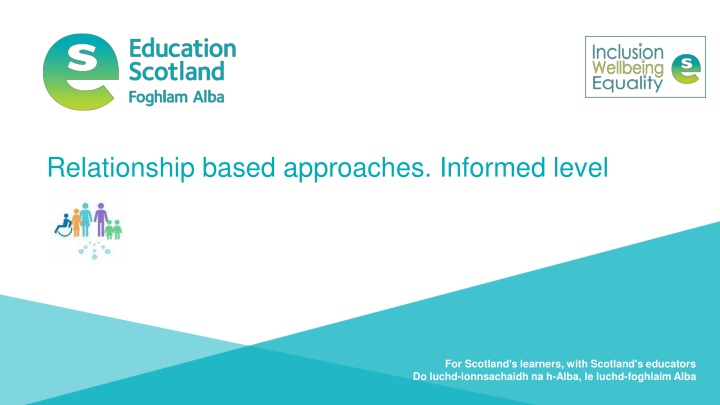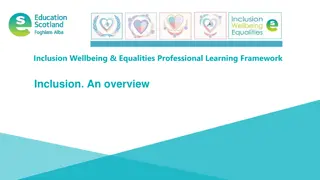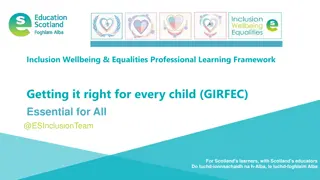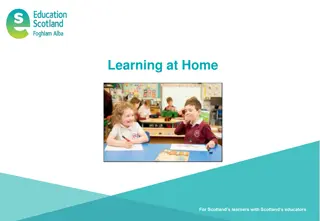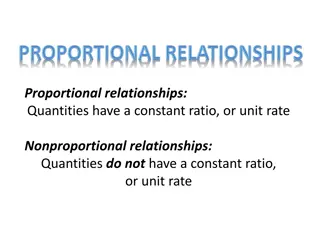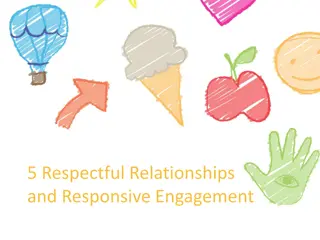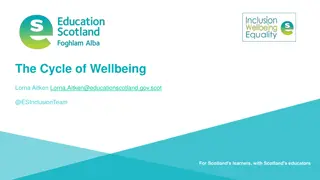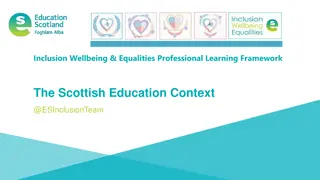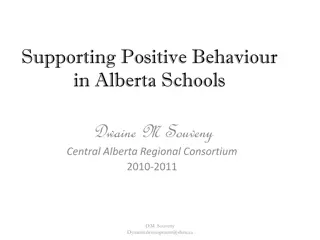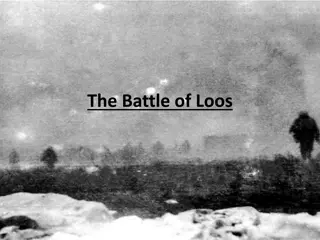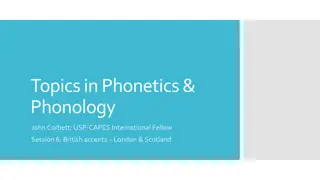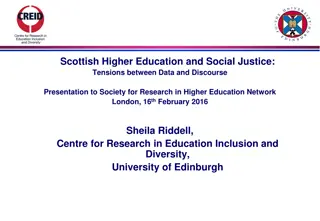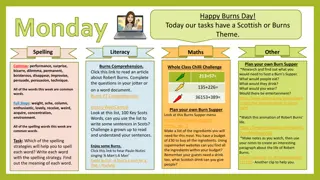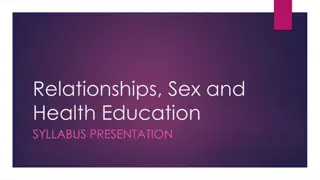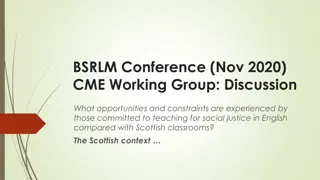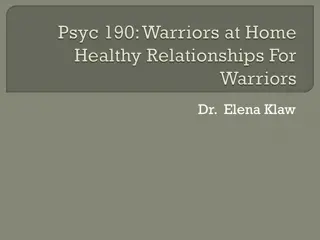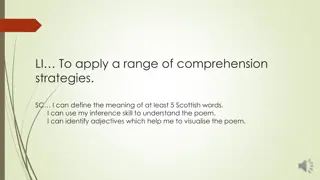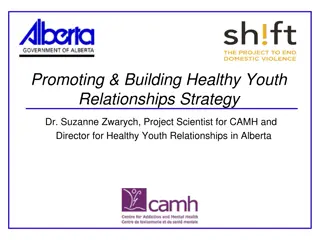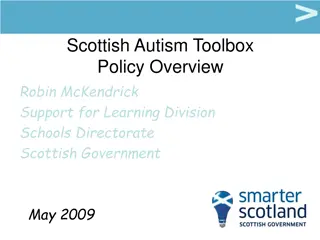Building Positive Relationships in Scottish Education
The Scottish approach to behavior in schools emphasizes relationship-based approaches over punitive discipline policies. Educators are encouraged to establish supportive relationships, promote a safe learning environment, and prioritize the well-being of learners. Positive connections and a culture of trust are crucial in fostering inclusive and compassionate learning environments. Practitioners focus on understanding and responding to student behavior holistically, with an emphasis on well-being and addressing barriers to learning.
Download Presentation

Please find below an Image/Link to download the presentation.
The content on the website is provided AS IS for your information and personal use only. It may not be sold, licensed, or shared on other websites without obtaining consent from the author.If you encounter any issues during the download, it is possible that the publisher has removed the file from their server.
You are allowed to download the files provided on this website for personal or commercial use, subject to the condition that they are used lawfully. All files are the property of their respective owners.
The content on the website is provided AS IS for your information and personal use only. It may not be sold, licensed, or shared on other websites without obtaining consent from the author.
E N D
Presentation Transcript
Relationship based approaches. Informed level For Scotland's learners, with Scotland's educators Do luchd-ionnsachaidh na h-Alba, le luchd-foghlaim Alba For Scotland's learners, with Scotland's educators Do luchd-ionnsachaidh na h-Alba, le luchd-foghlaimAlba
Overview The Scottish approach to behaviour in schools has evolved significantly in the past two decades from punitive discipline policies to a focus on building relationships and promoting positive pro-social behaviour. This shift in focus to relationship-based approaches has been embedded systematically into curriculum delivery and education related policies and guidance including those that promote attendance and participation, and those that reduce barriers to learning and exclusion. For Scotland's learners, with Scotland's educators Do luchd-ionnsachaidh na h-Alba, le luchd-foghlaim Alba
Relationship based approaches Within CfE all staff are expected to be proactive in promoting positive relationships and behaviour in the classroom, playground and the wider school community. There are specific experiences and outcomes in Health and Wellbeing which are the responsibility of all practitioners, who have a role in: Establishing open, positive, supporting relationships across the community, where children and young people will feel that they re listened to, and where they feel secure in their ability to discuss sensitive aspects of their lives Promoting a climate in which children and young people feel safe and secure modelling behaviour which promotes health and wellbeing and encouraging it in others using learning and teaching methodologies which promote effective learning being sensitive and responsive to the wellbeing of each child and young person. For Scotland's learners, with Scotland's educators Do luchd-ionnsachaidh na h-Alba, le luchd-foghlaim Alba
Positive Relationships Relationships form the basis of all relational approaches. Helpful relationships are simply the positive connections between people that foster positive social interactions and establish an environment of trust and support. They include those that are nurturing, trauma-informed, restorative, solution orientated, and encourage compassion and connection across communities. In a trusting and supportive environment people can disagree and challenge each other. Practitioners who are committed to relational approaches will generally: show unconditional positive regard to learners (accepting and supporting them exactly as they are without evaluating or judging them) understand and respond to behaviour in a respectful, child friendly and holistic way, considering the individual in the context of their family, community and culture proactively develop responses to support learners wellbeing and learners who may be at risk of disengaging or of being excluded actively listen, with purpose, to children and young people focus on inclusion, wellbeing, and addressing barriers to learning rather than punitive processes help children and young people to be aware of and understand the impact of their actions and behaviours For Scotland's learners, with Scotland's educators Do luchd-ionnsachaidh na h-Alba, le luchd-foghlaim Alba
Types of relational approaches Many different types of relational approaches are used in educational establishments across Scotland. No one approach is better than the others and none are mutally exclusive. Relational approaches compliment each other, however, when combining approaches, for example nurture and restorative approaches, care should be taken to ensure common language and skills are used across the establishment to avoid unnecessary complexity and confusion. Common relational approaches currently being used in Scottish educational settings include: Nurture and trauma-informed approaches (including Compassionate and Connected Classrooms and Communities) Restorative approaches (including peer mediation and solution oriented schools) and Mentors in Violence Prevention (MVP) For Scotland's learners, with Scotland's educators Do luchd-ionnsachaidh na h-Alba, le luchd-foghlaim Alba
Nurture Being nurturing means being both supportive and challenging. Nurturing approaches can help children regulate their emotions, relate to others, and behave positively. They encompass both universal and targeted support for individuals or groups. Largely based on attachment theory and an understanding of the impact of early adversity and child development, nurturing approaches focus on the learning environment and are based on the understanding of 6 core principles: All our children and young people s learning is understood developmentally Our learning environment offers a safe place for all children and young people Nurture and nurturing relationships are important for the development of wellbeing Language is a vital means of communication All behaviour is communication Transitions are important in children s and young people s lives. For Scotland's learners, with Scotland's educators Do luchd-ionnsachaidh na h-Alba, le luchd-foghlaim Alba
Trauma-informed Being trauma-informed means having an increased understanding of its impact such as poorer wellbeing, social and educational outcomes. Experiencing trauma is common and can effect both children, parents/ carers and school staff. In relation to behaviour, trauma can cause difficulties with regulating emotions, difficulties with trust and relationships, and increase the likelihood of risk taking or self-harming. Additionally, those affected by trauma may be less likely to seek or receive the help or support they need. Practitioners who are trauma-informed can: Offer consistent relationships that engender trust Recognise and understand the distress caused by trauma and its impact Recognise an individual s strengths and resources, and be ready to support these Reduce the risk of re-traumatisation. For Scotland's learners, with Scotland's educators Do luchd-ionnsachaidh na h-Alba, le luchd-foghlaim Alba
Restorative Being restorative can be proactive (relationship building) or responsive (relationship repairing) and can be used at every level from everyday informal interactions to more formal restorative meetings. Restorative approaches articulate with, and compliment all other relational approaches, and influence the emotional atmosphere in a learning community. A restorative approach recognises that people are the experts of their own solutions and if implemented effectively will promote accountability and maximise personal responsibility. A restorative approach provides a framework of values, thinking and language that is helpful when something needs to be repaired or restored. In different contexts this could be: effective communication relationships or friendships empathy and understanding for another person s perspective trust and respect (this could mean a sense of security, self-confidence, self-respect, or dignity) understanding the impact of our own behaviour on others repairing or replacing damaged materials or resources For Scotland's learners, with Scotland's educators Do luchd-ionnsachaidh na h-Alba, le luchd-foghlaim Alba
Restorative practice All practitioners can behave in a restorative way by demonstrating restorative values and using restorative thinking and language. Restorative values: Promote relationship building, conflict resolution and reconciliation Create environments where social learning and personal development can be supported Embrace qualities such as open-minded thinking, compassion, empathy, perseverance and cultural sensitivity Restorative thinking: Helps us understand another person s behaviour and reflect on our own behaviour Find solutions to disagreements and potential conflicts Promotes self-compassion, empathy and compassion for others Often involves thinking together which helps to develop our openness to alternative ways of thinking and potentially new ways of behaving For Scotland's learners, with Scotland's educators Do luchd-ionnsachaidh na h-Alba, le luchd-foghlaim Alba
Restorative language Changing one piece of language might not change the world but it might change the world for one student. (Whittaker, 2021: 67) Restorative language and having restorative conversations can generate opportunities for listening and participation, co-operation, build an awareness of social responsibility, and sensitively recognise social and cultural differences. Relationships are the essential component of restorative approaches. For Scotland's learners, with Scotland's educators Do luchd-ionnsachaidh na h-Alba, le luchd-foghlaim Alba
Restorative practice and learners who experience communication difficulties. Restorative Practice is a recommended way to resolve conflict between pupils and manage pupil behaviour than traditional methods such as punitive discipline, rewards and consequences. However, staff should be mindful that reasonable adjustments may have to be made if choosing to use this method with children and young people who have communication difficulties such as autism or cognitive complex needs. This is because restorative practice is only successful if the pupil can fully understand the dialogue and reflect on the incident with analysis. For example autistic learners may not be able to imagine and consider the perspectives and emotional responses of others and may not be able to generate ideas for resolution. So for many autistic learners, Restorative Approaches being used for conflict resolution, will not be appropriate. As always as with any approach it should be appropriately planned to meet individual needs. Autism Lense on Policy and Legislation | Autism Toolbox For Scotland's learners, with Scotland's educators Do luchd-ionnsachaidh na h-Alba, le luchd-foghlaim Alba
Education Scotland Denholm House Almondvale Business Park Almondvale Way Livingston EH54 6GA T +44 (0)131 244 5000 E enquiries@educationscotland.gsi.gov.uk For Scotland's learners, with Scotland's educators For Scotland's learners, with Scotland's educators Do luchd-ionnsachaidh na h-Alba, le luchd-foghlaim Alba
